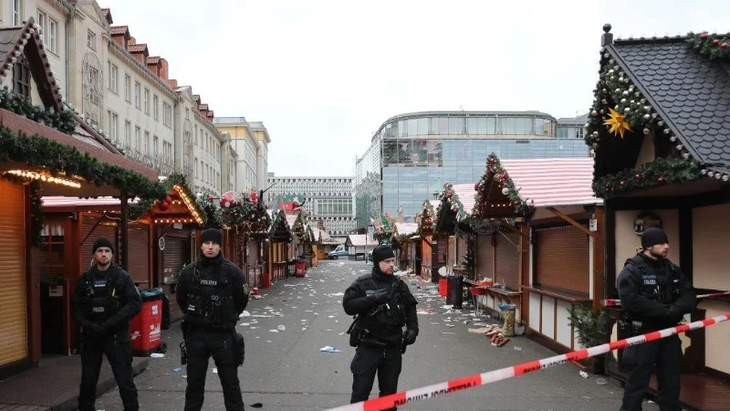(VOVWORLD) - Recent terrorist attacks in Europe and the United States have raised concerns over the growing threat of global terrorism. Experts warn that ongoing instability and conflicts, such as those in the Middle East, are providing fertile ground for extremist groups to expand.
On January 1, 14 people were killed and 30 injured when a man plowed a pickup truck into a crowd and opened fire in New Orleans, Louisiana, in the US. This latest terrorist incident has elevated global security concerns.
Threats from “lone wolf” terrorists
Christopher Raia, Deputy Assistant to the FBI Director, said the assailant in New Orleans may have been inspired by the Islamic State (IS) terrorist group because he was seen carrying an IS flag.
Colin Clarke, an expert from the global security consulting firm Soufan Group, said that whatever may be IS's current operational capabilities, the group's influence has inspired a wave of "lone wolf" attackers, individuals acting alone and not linked to any network. This means IS remains a threat and has not disappeared.
 Police cordon off the scene of the Christmas market attack in Magdeburg, Germany, December 21, 2024. (Photo: Xinhua/VNA) Police cordon off the scene of the Christmas market attack in Magdeburg, Germany, December 21, 2024. (Photo: Xinhua/VNA) |
On December 20, 2024, a similar terrorist attack occurred at the Magdeburg Christmas market in Germany, killing 5 people and injuring more than 200. Daniel Byman, Director of the Terrorism and Non-Regular Threats Program at the Center for Strategic and International Studies (CSIS), said this method has been used by IS terrorists in London, Berlin, and most seriously in Nice in July 2016, killing 86 people.
“In the last 10 years we've really seen ISIS embrace vehicle ramming. We've seen it in several European countries. We also saw it in New York, where someone used a vehicle to run down people on the sidewalk. This is certainly one of the Islamic State’s methods for killing a large number of people in a short time,” said Daniel Byman.
There has been a resurgence of “lone wolf” attacks in the US and Europe carried out by IS and its affiliate ISIS-K, including a bombing in Kerman city, Iran, in January and a theater attack in Moscow, Russia, in late March.
Hans-Jakob Schindler, Director of the non-governmental organization Counter Terrorism Project, said security threats are becoming larger and more difficult to deal with. “We are living in a time of heightened polarization, exacerbated by the ongoing conflict in the Middle East and the surge of IS and Al-Qaida around the world. We are living in a pretty difficult situation.”
Hotspot in Syria or Sahel
Reflecting the US's growing concerns about the rise of terrorist groups like IS in the Middle East, the Pentagon deployed additional troops to Syria after the opposition led by the Islamist group Hayat Tahrir al-Sham (HTS) overthrew the government of President Bashar al-Assad on December 8.
Pentagon Press Secretary Pat Ryder said there are now approximately 2,000 US troops in Syria, 1100 more than previously reported. The additional personnel are considered "temporary rotational forces", usually in theater just for 30 to 90 days.
US National Security Advisor Jake Sullivan said: “We have to recognize that the minute Damascus fell, ISIS began to look for any opportunity it could take to reconstitute, grow, spread, and ultimately recreate a platform from which to threaten the United States and Americans around the world. So the President ordered the US military to take military action against ISIS personnel and facilities and we're going to have to continue to do that.”
The key question now is whether the Trump administration will continue this policy. During his first term (2016-2020), President Trump vowed to withdraw all US troops from Syria and avoid entangling the US in conflicts in the Middle East. However, the current situation may lead the President-elect to reconsider. In a recent interview on Fox News, Congressman Michael Waltz, who is expected to serve as National Security Advisor in the new administration, suggested that Trump might not honor his pledge to withdraw US troops from Syria, acknowledging that the threat from IS remains.
The number of IS militants in Syria is estimated to be fewer than 3,000. Many believe they will be restrained by other forces, including the new Syrian government, Kurdish forces, and the Turkish army and its allies.
Brett Holmgren, head of the US National Counterterrorism Center, said the new "hot spot" of terrorism could be the Sahel region and West Africa, where not just IS but many other rebel and terrorist groups have increased their activities in recent years.